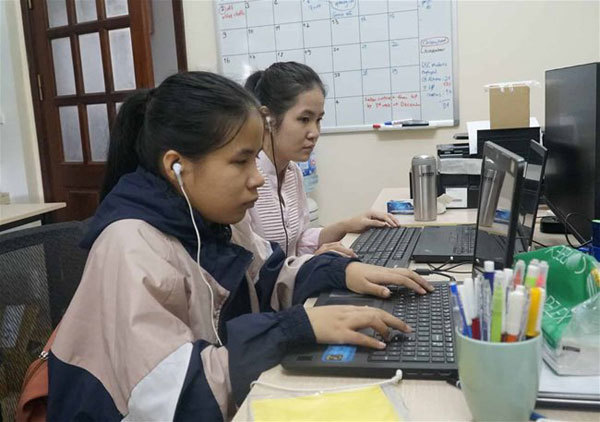 |
| People with disabilities are provided digital skill training so they can integrate into the economy – Photo: Courtesy of UNDP |
In Vietnam, nearly 7% of the population, or some 6.2 million people, live with one or several disabilities. According to the “Employment for Persons with Disabilities in Vietnam” study jointly launched by UNDP and the Ministry of Labor, War Invalids and Social Affairs on December 29, PWDs in the country face enormous barriers in accessing the labor market.
Many PWDs rely on the support of their families or social security payments. Additionally, they are more likely to have low-paying jobs with poor working conditions and limited career prospects.
The key challenges faced by PWDs in the labor market include discrimination and low self-esteem, lack of awareness and access to information and education, lack of access to public buildings and transport, lack of necessary qualifications and barriers on access to capital.
Discrimination against PWDs is still widespread as it is often assumed that PWDs are not able to carry out the required tasks, preventing them from applying, receiving or retaining jobs.
Low self-esteem plays an important role in preventing PWDs from accessing the labor market. Many PWDs are able to work but they are afraid of being subjected to discrimination.
“I think almost all jobs now require a good appearance. I am a person with dwarfism. I am currently 30 years old, but I weigh only 18 kilograms and my height is 1.16 meters, and my health is not good. So, it is difficult for me to apply for a job,” a disabled person said.
According to the Vietnam National Survey on PWDs, the percentage of PWDs who have not completed primary education and are employed is much lower than that of persons without disabilities. Up to 93.4% of PWDs aged 16 and above do not have any technical and professional qualifications and only 6.5% have diplomas and certificates.
Furthermore, PWDs have been severely affected by the Covid-19 pandemic since they are in a particularly vulnerable position. Many of them suffer from underlying medical conditions and have lower levels of financial and job security.
A recent UNDP rapid assessment with over 980 responses on the impact of Covid-19 on PWDs showed that a staggering 30% of respondents were left unemployed due to Covid-19. Nearly half of them saw their working hours reduced and among those employed, 59% faced pay cuts.
Although the Vietnamese Government has made a strong commitment to support PWDs, there is still a large gap between the law and practice on employment for them.
The employment of PWDs has not been included in national socio-economic development plans and strategies. The country lacks effective sanctions for businesses and organizations refusing to recruit fully qualified PWDs, while policies to incentivize businesses to employ PWDs are not effective in increasing the number of PWDs in employment.
Moreover, the number of self-employed PWDs and businesses employing many PWDs that can access preferential loans from the Vietnam Bank for Social Policies remains low.
To increase the volume and quality of employment opportunities for PWDs, the study suggests a number of solutions such as establishing local orientation services and job coaching mechanisms for PWDs and including employment support for the disabled in national strategies and plans.
The Government should encourage agencies and departments to employ PWDs to set an example for other employers and provide public funds to cover PWDs' internships in government and private companies to increase their skills and employability. SGT
Minh Tuan

77 percent of Vietnamese workers still don’t have officially recognized qualifications
Vietnam’s labor productivity has been been surpassed by Laos and Cambodia is not far behind. Labor standardization and vocational skill development are facing ‘unprecedented’ challenges.